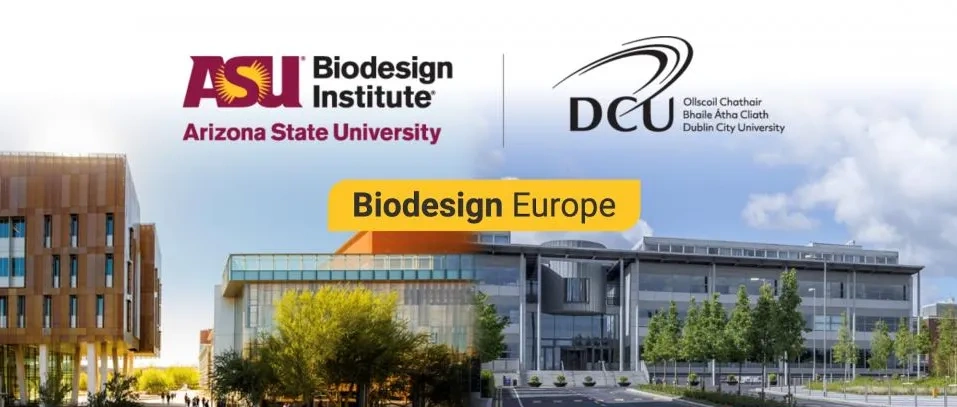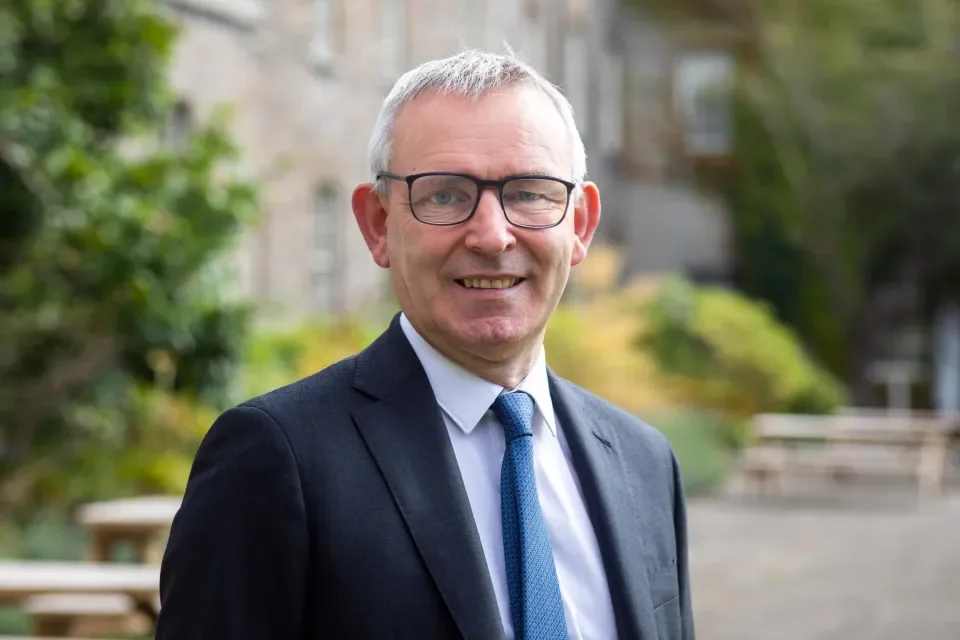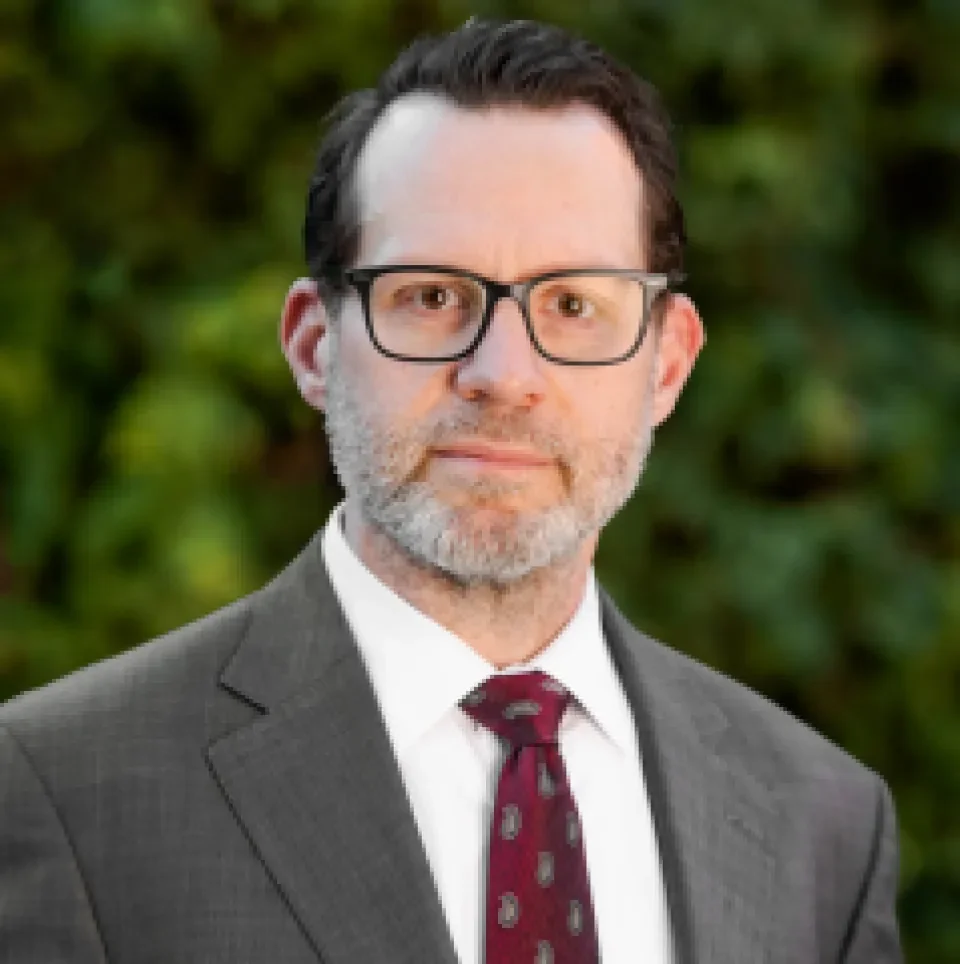

Arizona State University & Dublin City University Collaborative Doctoral Funding Program 2024
Introduction
Arizona State University (ASU) and Dublin City University (DCU) have been international
partners since 2006, aiming to advance education and research in both North America and
Ireland. Their collaboration is based on shared values of innovation, entrepreneurship,
technology-enhanced learning, and research and discovery. In 2013, the two institutions
formally established a comprehensive Transatlantic Higher Education Partnership, leading to
several initiatives focused on fostering a global research and innovation environment that will
have a positive impact on both communities in Arizona and Ireland.
One significant outcome of this partnership was the establishment of Biodesign Europe at DCU.
Biodesign Europe aims to harness and consolidate the substantial research infrastructure,
capacity, and expertise of ASU Biodesign Institute's 17 research centres and DCU's research
centres and institutes within the faculties of Science & Health and Engineering & Computing.
The core objective is to translate nature- inspired laboratory discoveries into tangible
technologies that can positively impact urgent global issues relating to human health,
sustainability, and security. To accomplish this, Biodesign Europe and the Biodesign Institute
bring together international experts from diverse fields, including engineering, biotechnology,
chemistry, computing, and biology and provide the necessary framework and support to enable
a holistic and transdisciplinary research approach.
In support of these objectives, ASU and DCU are implementing a joint funding call that will
support collaborative research projects that address significant scientific challenges in the
areas of Healthcare Technologies and Sustainable Materials and Manufacturing. The
collaborative funding program will support teams comprising of an investigator from each
institution and two PhD researchers, one based in ASU and one based in DCU. The team will
work collaboratively to tackle a complex research problem that would be difficult for individual
researchers to address alone. Funded projects are expected to produce promising preliminary
data or pilot work. This work will lay the groundwork for the research team to competitively
apply for larger, external funding to sustain the collaboration beyond the duration of the PhD
projects.
Forewords

Prof John Doyle
Professor John Doyle
Vice-President for Research
Dublin City University
On behalf of Dublin City University, I am delighted to introduce this collaborative research
program with the Biodesign Institute at Arizona State University, focused on tackling critical
challenges in Healthcare Technology and Sustainable Materials and Manufacturing. This
partnership highlights the transformative impact of international cooperation in addressing
some of the most urgent global issues of our time.
At DCU, our mission is to drive research excellence that has a tangible impact on society. We
believe that by working together with international partners such as ASU, we can leverage
our collective expertise and resources to innovate and develop solutions that not only
advance academic knowledge but also provide practical benefits to communities worldwide.
This collaboration aligns seamlessly with our strategic commitment to fostering
interdisciplinary research that addresses the complex issues facing our planet, from health
disparities to environmental sustainability.
By uniting the strengths of DCU and ASU, we aim to push the boundaries of what is possible
in healthcare technology and sustainable materials. This program is a testament to our shared
vision of creating a better future through scientific discovery and technological innovation.
We are excited about the potential breakthroughs that will emerge from this partnership and
look forward to the positive impact it will have on both our institutions and the global
community.

Prof Matt Hulver
Professor Matt Hulver
Vice-President for Knowledge
Enterprise Initiatives
Arizona State University

Prof Lara Ferry
Professor Lara Ferry
Vice-President for Research
Arizona State University
It is with great enthusiasm that we announce the launch of this collaborative program between
ASU and DCU. This initiative represents a significant step forward in our shared commitment to
addressing some of the most pressing global challenges of our time. By combining our
expertise, resources, and innovative spirit, ASU and DCU are poised to deliver cutting-edge
advancements in healthcare technologies and sustainable materials and manufacturing.
The partnership between our two institutions is founded on the recognition of our
complementary strengths. This collaboration not only enhances our individual capabilities
through meaningful knowledge exchange but also amplifies our collective impact on a global
scale. Together, we are committed to fostering an environment where bold ideas can flourish,
and where the boundaries of knowledge and innovation are continuously expanded.
In a world that is increasingly interconnected, the importance of international cooperation
cannot be overstated. The challenges we face—ranging from healthcare disparities to
environmental sustainability—are complex and multifaceted. They demand solutions that
transcend national borders and disciplinary silos. Through this partnership, we are embracing
this approach, recognizing that the most profound breakthroughs often emerge at the
intersection of diverse perspectives and expertise.

Prof Nicholas Dunne
Professor Nicholas Dunne
Executive Director, Biodesign Europe
Dublin City University
As Executive Director of Biodesign Europe, I am delighted to introduce this landmark
collaborative PhD research programme between Dublin City University and Arizona State
University. This transatlantic initiative marks a significant milestone in our commitment to
advancing impactful research and fostering interdisciplinary approaches to global
challenges.
The importance of this programme extends beyond immediate research outcomes. By
integrating knowledge across disciplines and international organisations, we are building
networks that enable us to tackle critical research challenges holistically. The synergy
between Dublin City University and Arizona State University will accelerate scientific
advancements and ensure their translation into practical applications that enhance
healthcare and promote sustainability.
A key aspect of this programme is broadening the experience of PhD researchers. Working
in laboratories across different countries will expose students to diverse methodologies,
cutting-edge technologies, and unique cultural perspectives. This international experience
will enhance their technical skills, adaptability, and cultural competence—valuable assets in
today's interconnected scientific community. Engaging in interdisciplinary projects will also
foster innovative thinking and prepare students for the multifaceted challenges of modern
research and industry.
This partnership exemplifies the power of collaboration in translating scientific discoveries
into societal benefits. By combining diverse expertise and perspectives, we can develop
innovative solutions to global challenges more effectively. The programme embodies the
spirit of cooperation and shared vision necessary to create a sustainable and healthy future
for all.

Prof Joshua LaBaer
Professor Joshua LaBaer
Executive Director
The Biodesign Institute
Arizona State University
As you know, the Biodesign Institute has been working together with our colleagues in
Biodesign Europe, at our sister site in Dublin. I am thrilled to present this collaborative
research program between the Biodesign Institute and Biodesign Europe. This initiative is
deeply aligned with our core mission, which is to harness the power of interdisciplinary
research to address critical global challenges and deliver real-world solutions.
The Biodesign Institute is committed to fostering innovation that transcends traditional
boundaries and drives scientific breakthroughs. Our collaboration with DCU epitomizes this
commitment, as it brings together leading experts from diverse fields to work on pioneering
solutions that can transform health care and promote sustainability.
This program underscores the importance of international partnerships in advancing our
shared goals. By leveraging the complementary strengths of the Biodesign Institute and
Biodesign Europe, we can accelerate the translation of scientific discoveries into practical
applications that improve lives and protect our environment. The integration of cutting-edge
research in health care technology and sustainable materials is a testament to our
collective dedication to creating a healthier and more sustainable future.
We believe that through this partnership, we will not only achieve significant research
milestones but also build lasting networks that will continue to drive innovation and
excellence. Together, we can make a profound impact on society, fulfilling the mission of the
Biodesign Institute to lead through discovery and innovation.
Arizona State University (ASU)

Arizona State University (ASU) is a world-leading, research-intensive institution which
consistently ranks highly in national and international evaluations of research universities. It has
been recognized for its research productivity, innovation, and impact, affirming its status as a
premier research institution. ASU has been ranked #1 in innovation for several years, ahead of
institutions like MIT and Stanford. It is also ranked among the top public research universities
by the National Science Foundation. ASU's research extends beyond academia, aiming to
create tangible benefits for society through initiatives like the Knowledge Enterprise, translating
research findings into real-world solutions that address societal needs and contribute to
economic development.
ASU places strong emphasis on interdisciplinary collaboration, transcending traditional
academic boundaries to tackle complex global challenges. Research centers and institutes,
such as the Biodesign Institute, integrate diverse fields, including engineering, life sciences,
social sciences, and humanities.
The university is equipped with state-of-the-art research facilities and laboratories, featuring
advanced technology. These resources enable both faculty and students to conduct pioneering
research in areas such as renewable energy, biomedical engineering, and artificial intelligence,
among others.
Dublin City University (DCU)

Dublin City University (DCU) is Ireland's fastest-growing university. Since its establishment in
1980, DCU has gained global recognition for its commitment to academic excellence,
groundbreaking research, and active community involvement. DCU is home to several centers
of research excellence that drive innovative solutions for global challenges. Major research
areas include health technologies, digital innovation and sustainable development.
DCU collaborates actively with industry, government, and international partners, converting
research into real-world applications and contributing to economic growth and societal wellbeing.
DCU has cutting-edge facilities, including the state-of-the-art DCU Alpha Innovation
Campus, which supports start-ups and research-driven enterprises. The university also houses
advanced health and human performance research facilities, featuring specialized laboratories
supporting academic research and community health initiatives.
DCU supports entrepreneurship through incubator programs, mentoring, and funding access.
DCU Invent promotes a thriving start-up ecosystem, inspiring researchers to turn innovative
ideas into successful businesses. DCU has a strong network of global partnerships with top
universities and research institutions, enriching academic exchange, collaborative research
projects, and global learning opportunities. Additionally, DCU is involved in social innovation
projects, tackling issues such as urban regeneration, social entrepreneurship, & inclusive
education.
Scope of the Call & Objectives
The ASU-DCU Collaborative Doctoral Funding Program will fund research projects that align
with one of the following thematic areas:
- Healthcare Technologies: Projects which enhance the quality, effectiveness and/or
efficiency of healthcare delivery and/or patient care by fostering innovations that address
current and/or emerging health challenges. Includes but is not limited to research areas
such as: biomedical engineering, precision medicine, diagnostics, drug development or
delivery, biotechnology, regenerative medicine, robotics, prosthetics, tissue engineering,
biomaterials, medical imaging, advanced analytics/AI in healthcare, human performance,
cybersecurity. - Sustainable Materials & Manufacturing: Projects which advance the development of
materials that are environmentally friendly, biodegradable or derived from renewable
sources. Also includes the development of manufacturing processes that will reduce
environmental impact, enhance resource efficiency and promote circular economy
principles. Includes but is not limited to circular economy, sustainable manufacturing,
sustainable design, biomass engineering, marine, water quality, semiconductors, next
generation materials and cybersecurity.
It is expected that one project per thematic area will be funded, however, should the quality of
applications in one thematic area be much higher than the other, the executive team may decide
to fund two projects under the same theme.
Objectives of the ASU-DCU Collaborative Doctoral Funding Program
- Build translational research programs leveraging complementary strengths
- Advance world-class reputation for research innovation
- Expand global research networks
- Sustain research collaboration ambitions through external funding generation
Funded Teams will be expected to strongly engage with the Biodesign Europe Senior Research
Development Lead to identify future research directions, external funding opportunities and
partnering/stakeholder activities.
Eligibility Criteria
Eligible Applicant Teams must include:
- A member of academic staff from the DCU Faculty of Science & Health or the DCU
Faculty of Engineering & Computing - A member of academic staff affiliated with one of the Biodesign Institute Centers at ASU
- To ensure a timely and synchronized start to projects in Spring 2025, each investigator
at each institution must also identify a prospective PhD researcher to join the project, at
the time of submission. A CV for each prospective PhD researcher should be uploaded
with the final application.
While additional collaborators outside of the above applicant team are welcome, the following
categories are not eligible to be part of the core applicant team:
- Members of academic staff at DCU or ASU on temporary contracts which do not cover
the full duration of the project (4-5 years, starting from mid-2025). - Executive Directors of DCU Biodesign Europe (Prof Nicholas Dunne) and/or the ASU
Biodesign Institute (Prof Joshua LaBaer). For transparency and fairness during the
ranking process, Executive Directors should not be approached for input into proposals
prior to submission. - Academics in ASU or DCU who are not affiliated with the ASU Biodesign Institute or the
DCU Faculties of Science & Health or Engineering & Computing. Other ASU and DCU
staff are welcome to be involved as collaborators but may not be one of the core
investigators on the projects. - Additional external stakeholders or collaborators from academia, industry, public sector
etc. are encouraged but should add a meaningful contribution to the project objectives
and student training and development.
Funding Available & Start Dates
Each funded project will receive funding for two full-time fully funded PhD students, one to be
based at DCU and one to be based at ASU. Each student will be funded in line with local funding
levels for PhD researchers.
PhD students based at DCU will be funded in line with IRC Government of Ireland rates for four
years as is customary in DCU.
Biodesign Europe will also offer additional travel support for the research team in DCU, where
there are clear objectives for a research visit.
PhD students based at ASU will be funded for 5 years, as is customary in ASU and includes
salary, tuition and ERE costs. The ASU funding package will also include a contribution towards
foreign travel, housing, supplies and fees.
Evaluation Process & Criteria
Evaluation Process
Applications will be reviewed by a panel of academic peers from ASU and DCU who have
expertise in the broader area of the application topic and who are not involved in any
applications.
While a best effort will be made to match applications to reviewers in the same field, applicant
teams should be aware that their applications may be reviewed by a peer who may not work
directly on the research topic. As such, applicant teams are advised to develop their applications
in a way that is accessible to a more generalist reviewer.
Reviewers will evaluate applications based on the criteria and weightings listed below.
Reviewers will provide qualitative and quantitative feedback. These rankings will be collated by
Yvonne Smith (DCU) and provided to the Executive Directors and VPs at both institutions for
final consideration at a consensus meeting. The Executive Directors and VPs will then make a
funding recommendation based on the peer review feedback. Applicants will receive the
collated peer feedback at the end of the review process.
Evaluation Criteria
The evaluation will be based on the following criteria:
1) Scientific excellence (40%)
2) Complementarity and synergy of the collaborative team (20%)
3) Future potential to secure external funding (20%)
4) Impact and Strategic Alignment with ASU, DCU, Biodesign Institute and Biodesign
Europe priorities (15%)
5) Project Management and Implementation (5%)
Submission Process
Applications should be submitted via the ASU InfoReady application portal. This system accepts
applications from ASU Staff and External Collaborators. External Collaborators to ASU may
create an account on the site at the following link: https://asu.infoready4.com/
Applications should be submitted once on InfoReady by either the ASU or DCU Principal
Investigator.
The deadline for applications is 1pm MST (Arizona)/ 8pm GMT (Ireland) on Friday November
29th 2024. The InfoReady will not accept applications after this time. For fairness and
transparency, applications submitted late or by email will not be accepted for evaluation.
Applications should be submitted following the proposal template detailed in Appendix I of this
Call Document. Font size should be a minimum of size 11 in either Arial, Calibri or Times New
Roman, with minimum margins of 1.5cm. Proposals exceeding the specified page limits will have
the additional pages removed before being sent for peer review. Figures and Diagrams are
permitted within the specified page limit.
For queries relating to the submission process or to seek support finding a collaborative
partner, please email:
Yvonne Smith, Senior Research Development Lead for Biodesign Europe at DCU
(yvonne.smith@dcu.ie)
Please note that as program manager for this call, she is not able to comment on the quality of
applications or assist in the development of applications.
Application form link
Submission Process
Applications should be submitted via the ASU InfoReady application portal. This system accepts
applications from ASU Staff and External Collaborators. External Collaborators to ASU may
create an account on the site at the following link: https://asu.infoready4.com/
Applications should be submitted once on InfoReady by either the ASU or DCU Principal
Investigator.
The deadline for applications is 1pm MST (Arizona)/ 8pm GMT (Ireland) on Friday November
29th 2024. The InfoReady will not accept applications after this time. For fairness and
transparency, applications submitted late or by email will not be accepted for evaluation.
Applications should be submitted following the proposal template detailed in Appendix I of this
Call Document. Font size should be a minimum of size 11 in either Arial, Calibri or Times New
Roman, with minimum margins of 1.5cm. Proposals exceeding the specified page limits will have
the additional pages removed before being sent for peer review. Figures and Diagrams are
permitted within the specified page limit.
For queries relating to the submission process or to seek support finding a collaborative
partner, please email:
Yvonne Smith, Senior Research Development Lead for Biodesign Europe at DCU
(yvonne.smith@dcu.ie)
Please note that as program manager for this call, she is not able to comment on the quality of
applications or assist in the development of applications.
